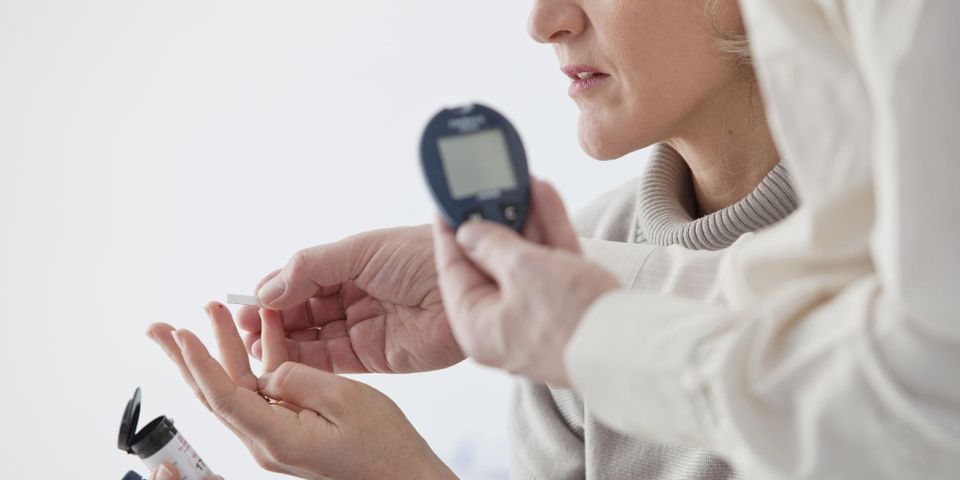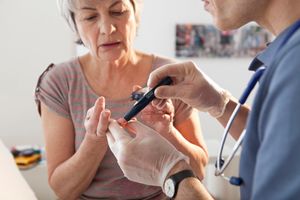How You Can Help a Loved One With Diabetes

November is National Diabetes Awareness Month, and while most people have heard of this condition, there are common misconceptions about what it is and what causes it. You’re probably aware of the two types, and you likely associate Type 1 with kids who often faint and Type 2 with overweight adults. But these generalizations—and the conditions’ shared umbrella—are slightly misleading. The best way to be there for a diabetic loved one is to learn more about the condition and help them find ways to incorporate necessary tools, like home health care, into their life to accommodate for it.
The Difference Between Type 1 & Type 2 Diabetes
Type 1
Also known as insulin-dependent diabetes, this condition comprises less than 10% of all diabetes cases. It usually affects children and has sudden and evident symptoms. The pancreas of a patient with Type 1 diabetes is unable to make insulin, a hormone that regulates your body’s blood sugar levels. The cause of this condition is unknown, but theories point towards exposure to an unknown environmental trigger as an impetus to this autoimmune response.
When diagnosing a child, doctors will take a urine sample to look for the presence of ketones, a byproduct created if your body uses muscle or fat tissue to produce energy. They will also test a patient’s blood for autoantibodies, destructive immune system cells linked to this condition. A person will use an insulin pump to regulate their blood sugar if they have Type 1 diabetes.
Type 2
This condition is often associated with obesity, but a number of risk factors come into play with Type 2 diabetes, like genetic predispositions, high blood pressure, age, and poor diet. It makes up over 90% of all diabetic cases and falls under the same umbrella as Type 1 due to the body’s inability to effectively process sugar. With Type 2, your pancreas may have insulin present, but there’s not enough to do its job efficiently. Most patients take an oral prescription to regulate either insulin or glucose in the body, but if their pancreas stops insulin production completely, then an insulin pump comes into play. When the condition progresses this far, home health care is usually an important option to implement, as the disease has likely progressed because the patient regularly forgets to take medication.
You may not show symptoms before diagnosis, which is why anyone over the age of 45 should have their doctor test their glycated hemoglobin (A1C). This test measures your body’s average blood sugar level over the past two to three months by identifying the percentage of blood sugar attached to the oxygen-carrying protein in red blood cells. An A1C between 5.7 and 6.4 marks prediabetes, and 6.5 or higher means you have diabetes.
How a Caregiver Can Help Seniors with Diabetes
 Diabetes can be an overwhelming condition, especially for the elderly, but creating a routine to manage it is key to a healthy life after diagnosis. By educating yourself on a loved one’s specific type of diabetes, you can help guide them towards habits that optimize their health. Maintaining a routine can prove difficult for older patients, though, which is why professional home health care can make a difference in the life of your loved one. A caregiver would be responsible for preparing their food and building a healthy diet. They would also offer reminders to take medication, take your loved one to appointments. and generally keep their health routine on track.
Diabetes can be an overwhelming condition, especially for the elderly, but creating a routine to manage it is key to a healthy life after diagnosis. By educating yourself on a loved one’s specific type of diabetes, you can help guide them towards habits that optimize their health. Maintaining a routine can prove difficult for older patients, though, which is why professional home health care can make a difference in the life of your loved one. A caregiver would be responsible for preparing their food and building a healthy diet. They would also offer reminders to take medication, take your loved one to appointments. and generally keep their health routine on track.
Elder care aims to give your senior loved one the ability to thrive while remaining in the comfort of their own home. That mentality stood at the heart of Ada Joyce Taylor’s mission when she created Deer Valley Home Health Services, which provides in-home health care to the elderly, veterans, and special needs individuals in the Berkeley, St. Charles, and St, Louis, MO, areas. Their staff takes pride in their attentive service catered towards the needs of the individual client. For more information about their range of services, visit them online or call (314) 773-4433 for their St. Louis office, (314) 355-3679 for Berkeley, and (636) 493-6488 for St. Charles.
About the Business
Have a question? Ask the experts!
Send your question

